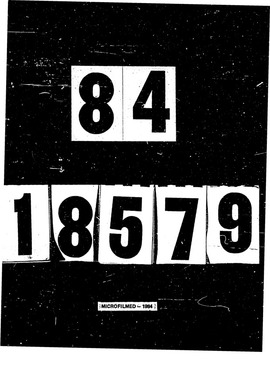| dc.contributor.author | Torres, Cresencio, | en_US |
| dc.date.accessioned | 2013-08-16T12:29:04Z | |
| dc.date.available | 2013-08-16T12:29:04Z | |
| dc.date.issued | 1984 | en_US |
| dc.identifier.uri | https://hdl.handle.net/11244/5230 | |
| dc.description.abstract | A sample of 115 adult students from the College of Education at the University of Oklahoma were administered both the Myers-Briggs Type Indicator (MBTI) and the Language System Diagnostic (LSD) test. All subjects were volunteers between the ages of 19 and 39; 96 were female and 19 were male. Subject preferences scores obtained from the MBTI and the LSD test were analyzed using Chi Square analysis procedues. | en_US |
| dc.description.abstract | In conclusion, this study implies that there is an even distribution of introverts and extroverts utilizing the auditory, visual, and kinesthetic language language representational systems. Furthermore, this study indicates that there is no relationship between language representational system utilization patterns and Jungian psychological types. | en_US |
| dc.description.abstract | The results found that there was an even distribution of primary language representational systems between introvert and extrovert personality types. However, there were no significant differences found in the obtained and expected frequency responses among LSD test variables of auditory, visual, and kinesthetic, and MBTI variables of introvert-sensing, introvert-intuitive, extrovert-sensing, and extrovert-intuitive types. | en_US |
| dc.description.abstract | The purpose of this study was to investigate the relationship between personality type and primary language representational system patterns in the verbal communication process. This research attempted to determine whether personality types as identified by Jungian psychological typology utilize specific language representational systems as described in the Neuro-Linguistic Programming model. | en_US |
| dc.description.abstract | In addition, the Language System Diagnostic (LSD) test was an important outcome of this research. It is the first instrument developed that operationalizes a key element from the Neuro-Linguistic Programming model, specifically, language representational systems. | en_US |
| dc.format.extent | x, 98 leaves ; | en_US |
| dc.subject | Education, Adult and Continuing. | en_US |
| dc.title | An investigation of language representational system utilization by personality type / | en_US |
| dc.type | Thesis | en_US |
| dc.thesis.degree | Ph.D. | en_US |
| dc.thesis.degreeDiscipline | Jeannine Rainbolt College of Education | en_US |
| dc.note | Source: Dissertation Abstracts International, Volume: 45-05, Section: A, page: 1271. | en_US |
| ou.identifier | (UMI)AAI8418579 | en_US |
| ou.group | Jeannine Rainbolt College of Education | |
